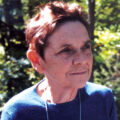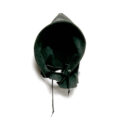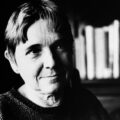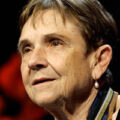Adrienne Rich in Chile: an Interview
Adrienne Rich travelled to Santiago, Chile, in March 2001 to attend ChilePoesía’s inaugural gathering of international poets. The weeklong festivities included both large-scale public readings and smaller events in Santiago, Valparaíso, and Pablo Neruda’s house in Isla Negra. Rich joined sixteen fellow poets including Rita Dove, Ernesto Cardenal, Ferreira Gullar, Amanda Berenguer, Antonio Cisneros, Nicanor Parra, Raúl Zurita, Juan Gelman, and Günter Grass, who joined the lively group via teleconference. The Friday evening event at the Moneda Palace in downtown Santiago presented a particular challenge. ChilePoesía’s organizers sought to reclaim the space, to take it over with poetry, a gesture meant to highlight and reframe the historic bombing of the Palace on September 11, 1973, which ushered in the Pinochet regime. Their ambition was political and grandiose, but the execution was subtle and transformative. One by one, the poets took turns reciting their works from the building’s balconied windows, and as one window went dark at the end of a final verse, another lit up. The crowd, young and old, stood below in silence. We were listening.
When I found myself sitting next to Rich at a luncheon hosted at the home of US Ambassador John O’Leary by his wife Patricia Cepeda, a Spanish interpreter and the goddaughter of Gabriel García Marquez, I was overcome by two emotions: awe, and fear that I would prove an unworthy table companion. I was 23, angst-filled and impatient, a recent Harvard grad keen on figuring out my identity as a Chilean-born woman who had been raised mostly in California. Rich had a calm presence and a youthful charm. She moved and walked slowly, with a cane, due to the rheumatoid arthritis that would eventually claim her. I had a stack of her books in my lap, including her 1976 treatise Of Woman Born: Motherhood as Experience and Institution. I wanted to ask her the most intimate questions I could imagine: should I have children, should I try to write poems, what about falling in love and what about desire, how dangerous could it really be? But I had already had my chance to question her, and she had done her best to reply. A few weeks prior to the lunch in Chile, I had conducted an interview of Rich over fax for the leading Chilean newspaper, El Mercurio (“Entrevista con Adrienne Rich: Rescatar la material prima del poema” was published in Spanish on March 18, 2001).
Rich had responded to my initial query on February 15, 2001: “I shall be happy to do an interview with you. I don’t have e-mail, and don’t do telephone interviews, but you could fax me several questions and I will gladly fax back the responses.” Little did she know that I would send a list of two dozen questions with the promise of a few more about her most recent book at the time Midnight Salvage: Poems 1995-1998. Rich was gracious in her seven page reply. Though nearly 15 years have passed since “our faxed dialogue,” Rich’s precise meditations remain both urgent and luminous.
Poetry and Politics
Magdalena Edwards: How do you perceive the relationship between poetry and politics? Do you write “political poetry”?
Adrienne Rich: I have written a good deal in prose on this relationship (which I do not regard as static) particularly in my book What Is Found There: Notebooks on Poetry and Politics (1993). I was trying to confront the strange “American” belief that poetry and politics should exist in separate realms, that a politically engaged poetry must sacrifice aesthetic standards, and that the poet is socially irrelevant. I started the book at the beginning of the Gulf War and the decade of the so-called triumph of free enterprise, the so-called “end of history,” (especially revolutionary or socialist history). What I discerned in the U.S. was a convergence of poetic voices coming from many different rents in the social fabric, many cultures, many tributaries, which, together, make up the American poetry of the late twentieth century. I used a great many of these voices in the book, both poetry and prose, to suggest the power and vitality of this tradition.
I learned a great deal in writing that book, not least how without poetry’s presence in the social realm the society’s imaginative powers are diminished and shrunken; how much community and poetry have to do with each other. I’ve written on art and politics often since—notably in my forthcoming book of essays Arts of the Possible. I define “politics” in this sense as the on-going collective struggle for liberation and for the power to create—not only works of art, but also just and nonviolent social institutions. There is no way I can see that the poet can stand outside all that. How to make a poetry adequate to the crisis we’re now in, is another question.
So, when you ask, “Do you write political poetry?” I say yes, I have done so since the mid-sixties and the artists’ protests against the Vietnam War. As a very young poet, I had been brought up on that dogma that politics was bad for poetry. What I search for continuously in my art is adequate language, language I hope can stand beyond any particular occasion. What I’m finding is that in our increasingly dysfunctional U.S. society, marvelous poetry is being written—out of and amid the dysfunction.
Poetic Form
ME: How would you describe the shifts in your use of form from your earliest poems until now?
AR: I began as a formalist because that was the poetic tradition—Anglo-European—that I first knew. Walt Whitman and Emily Dickinson were there of course, but Dickinson’s work was edited into a prim textual conformity until 1960 when the poems in their original form exploded my ideas of poetry. Also, my own life pushed me beyond the conventions of formalism—along with reading my direct contemporaries who were exploring open forms, like Denise Levertov, W.S. Merwin, and Galway Kinnell. All this was in the Sixties when the most intense life was lived around politics—the Black Civil Rights movement, the anti-Vietnam War movement, very large moral questions were in the air, along with a great deal of hope, and the revolutions in Africa and Central America were part of that consciousness. That period has been trashed by the Right as mere posturing, violence and drug abuse. But it was in many ways both a practical and a visionary time.
ME: Which poets have influenced your writing most? Did you eventually have to break with them in order to continue your writing? The writing workshop is an institution among writers and poets in Chile. Did a specific poet or workshop experience “form” you? What is your opinion of the proliferation of writing workshops and MFA programs in the United States?
AR: Over many years (I am almost 72) so many poets have touched my imagination and opened paths for me—it hardly makes sense to list them. I have always read a great deal of poetry. Some poets—like Robert Lowell, Denise Levertov, Randall Jarrell, Jean Valentine, Audre Lorde, Hayden Carruth, Jane Cooper, June Jordan, Joy Harjo, Clayton Eshelman—have been my friends, we’ve been comrades in exchanging work and encouraging each other… But I’ve also been powerfully affected by Wallace Stevens, Hart Crane, Muriel Rukeyser, Aimé Césaire, Robert Duncan—poets I met briefly if at all. Baudelaire, Sachs, Celan, Ghalib, Mandelstam…all in translation. This kind of influence isn’t textual, exactly—it’s like having windows open on “what is possible.” And this kind of intensive reading of many poets, and dialogues with a few, seems to me more fertilizing to a poet’s life than immersion in workshops. I think poets should work in the non-literary, non-academic world, get to know more than a workshop or a university.
ChilePoesía
ME: What are your expectations of ChilePoesía? Do you feel an affinity towards any of the other poets attending?
AR: I wanted to come to ChilePoesía because many strands merge for me here. In 1989 I saw a photograph of the fence outside Pablo Neruda’s house, inscribed after the Pinochet coup by many anonymous hands with messages of love for the poet and the vision he had stood for. That image has remained with me as an emblem of how a community keeps the poet and poetry alive. Some time before, a friend, a Chilean exile, had given me a lump of lapis-lazuli, which I keep on a bookcase in my workroom, and which is mentioned in my poem, “Blue Rock.” Through the ‘70s and ‘80s I was becoming aware of my country’s role in destabilizing the emergent socialist and democratic governments throughout the Americas.
I am a citizen of a country that has just undergone a thieved election, a country deeply and dangerously divided between rich and poor, but also between rich and middle class. What I believe in and what my government represents are not the same thing.
I understand that this is a historic moment in Chile. Having an international poetry festival at this time seems to me a true act of the imagination. I am moved and honored to be invited from the country that has so wronged Chilean aspirations toward democracy. Of course I look forward to encounters with individual poets, from Chile and many other countries.
Four Questions on Dark Fields of the Republic: Poems 1991-1995
ME: The poem “In Those Years” seems to present an “I” who has become a monster. Where do the “I” and the “we” fall here?
AR: “In Those Years” ends: “where we stood, saying I.” Here the poet speaks to her community, which (as we’ve seen in the U.S.) has become privatistic, self-involved, atomized. Where there was once a “we” there is now only an “I.” But in addressing her society as “we” she implicitly opens the possibility of a future “we” which the knowledge of history can give us. (But of course the poem is itself; the explication is something after the fact.)
ME: “And Now” reveals a certain cynicism, for example: “when the name of compassion / was changed to the name of guilt / when to feel with a human stranger / was declared obsolete.” Do you believe this has happened today?
AR: One of the insidious rhetorical devices of the U.S. Right has been to claim (for example) that empathy with others is merely “liberal guilt” or “political correctness,” that compassion is merely sentimental or even hypocritical. I see it as an entirely cynical view that underscores the profit motive as the only real basis for human relationships.
ME: What work do you ask the colon and slash to do in these poems?
AR: I am always interested in the ways of scoring the sound of the poem, especially a poem with long lines. Spaces within a line, double colons, slashes, are indications of pause, of breath, of urgency, they are not metrically exact as in a musical notation but they serve (I hope) to make the reader think about the sound of the poem—just as traffic symbols, when driving, make us almost unconsciously aware of a steep hill, an intersection, an icy bridge etc. Poets have used such indicators long before modernism—Dickinson’s dashes and capitals are one example. Contemporary composers have also expanded on classical notation with new, self-invented markings.
You want to find a way that is not random or chaotic but allows for various renderings of a line, a punctuation of the imagination.
ME: Is there a relationship between the woman who returns alone in “Reversion” and the lone explorer in “Diving Into the Wreck”?
AR: “Reversion” was written after seeing Nina Menkes’ arresting film, “The Great Sadness of Zohara.” It has one protagonist, a woman from the Orthodox Jewish quarter of Jerusalem, who is in inward rebellion against her role and religion but absolutely alone in her protest. She starts walking and eventually finds herself in a distant Arab town. She has certain encounters and recognitions, but finally no choice but to return where she came from. My poem simply narrates in language what the film—almost without dialogue—narrates in images. It’s not a happy ending! But I think suggests realism rather than futility—that women cannot become liberated one by one. But individual revolt is not simply futile.
In “Diving Into the Wreck” the narrator is really double: female and male, mermaid and merman. To explore the wreck of gender identity seemed, in 1972, a dangerous and lone undertaking. Cousteau on the other hand is supported and institutionalized; he is seen as pursuing a recognized scientific endeavor.
ME: How do you measure happiness?
AR: “The issue is happiness,” the poet George Oppen says in the epigraph I took for Midnight Salvage. I’ve known great happiness in my life along with great darkness, and a question that has repeatedly entered my poetry has been, how do we use the direct experience of happiness that may be given us, whether of love and sexuality or creativity or the sense of connectedness with other beings, human and otherwise? The philosopher Hannah Arendt writes about the concept of “public happiness”—the sense of being a participant, a citizen, of sharing the power to create collectively. She says that’s what the framers of the U.S. constitution really intended in saying that “men” are endowed with the inalienable right to the “pursuit of happiness.” The idea becomes more tantalizing in a society where most citizens feel individually and collectively disempowered—as just now in the U.S. But the issue of happiness turns up also in the poetry of Charles Olson, and in my poem, “Camino Real,” I have a dialogue with both Olson and Oppen, in which I say, “Why measure? It’s itself the measure.” It occurs to me now that Whitman was not simply inventing an ideal United States; he was trying to show what public happiness would feel like, along with public grief and mourning as in his Civil War poems.
ME: How do you see your work in Midnight Salvage and where are you headed next?
AR: Dark Fields of the Republic and Midnight Salvage were written during the final decade of the twentieth century and against the grain of their society. The economic and technological expansion, with the terrible human and environmental prices paid, were (and are) accelerating, while at the same time language itself, the medium of my art, was deteriorating. We had become the country with the highest incarceration rate in the world. Those poems are footprints of my travels through that landscape—footprints of a poet, a citizen, a woman, a witness to this whole process. I believe that there are fiery and illuminating images in Dark Fields, and that Midnight Salvage (the name of a junkyard I used to pass) is a book of salvaging, from history and memory, some wherewithal to continue in hope. Some of these poems use collage—“A Long Conversation” perhaps most ambitiously, where I draw on the words of Blake, Mandelstam, Che Guevara, Marx, Nixon, and others.
My new book Fox will come out in October; it feels different to me but I can’t yet say how.
ME: What can poets do in countries like Chile to aid the processes of history and memory? What must poets do?
AR: I could not possibly presume to say what poets in other Americas should or must do. For myself it is an ever-present challenge to draw lines of connection between personal feelings and their social dimensions, “the body’s pain and the pain on the streets” to recognize that an economic system can impact on human sensibility—Marx’s idea that exploitative relations of production end by affecting all human relations, the most private and intimate included. These are finally not just ideas, they become our feelings. And it’s in feelings that poetry is rooted.
Adrienne Rich interviewed by ChilePoesía
About Magdalena Edwards
Magdalena Edwards was born in Santiago, Chile, and raised in Chicago, Los Angeles, and Washington D.C. Her work has appeared in The Millions, the Los Angeles Review of Books, The Paris Review Daily, Rewire Me, and Rattle. She is an editor at LARB, and is working on a book about poet-translators across the Americas.






